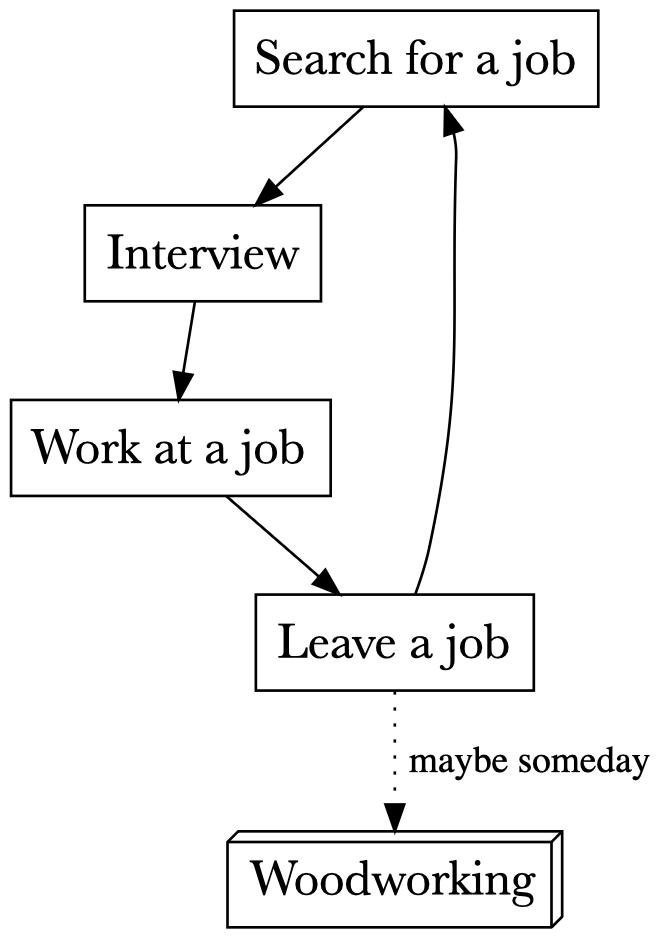
A friend is switching jobs and asked my thoughts on participating in an exit interview or giving the company feedback. I don't think this is worth doing, but I do think there are some good things to do on your way out of a job, even one that's toxic and unpleasant.
Don't Do Exit Interviews, but Be Nice About It
There's a lot of advice on not doing exit interviews and it's spot on. There's no upside to doing them. The company does not care. I honestly don't know why companies even bother doing them at all. But, if you are asked for forced, don't be a jerk. Just politely say you don't have any feedback.
What you should do is give individuals and their managers feedback.
Your Career is a System…and So is Everyone Else's
Think of your career—and the careers of others—as a system that includes interviewing for jobs, performing in them, leaving them, finding new ones, etc. You do this in a lengthy cycle that hopefully ends in a nice retirement hobby, but nevertheless is the grind of capitalism…for better or for worse.

But your career-as-a-system is intertwined with others'. You could be interviewing while someone you know is working where you are interviewing. Or someone you know could be considering quitting while you are searching for a job. The interactions we all have with each other is an even bigger system (and an actual social network).
A great way to spend your last two weeks at a job is to cultivate this network by having one last positive impact on the careers-as-systems of your co-workers. When you leave, your co-workers will still be there. Why not help them—and their managers—get promoted and succeed in their careers?
A Four Step Plan To Help Everyone…Including Yourself
- Make a list of everyone you've worked with in the last, say, six months. Don't just include other engineers, include everyone in your list.
- Try to write two or three positive and affirming pieces of feedback about your interaction with them. The feedback is ideally something that the person would appreciate hearing and would be viewed as valuable to the company. It should be substantive, falsifiable, and specific. You may not be able to do this for everyone…that's OK.
- For anyone where you able to write out some decent feedback, figure out who their boss is—whoever's job it is to get them promoted.
- Email both the person and the boss—same email—with the feedback. Write it succinctly and authentically. Do not include critical or constructive feedback. That's not the point of this. The purpose is to leave an unambiguous signal of the great things the person has done. Someone else can manage constructive criticism.
You can, optionally, reach out to the person privately to share constructive feedback, which I would simply call "advice". Do this only with those you trust and with those who would take such advice/feedback well. It's always safe to not do that, but never share constructive feedback with their boss. You want your co-workers who do well to be promoted. It'll be hard enough for them as it is.
This is Worth Doing for Selfish and Selfless Reasons
You could certainly just coast during your last two weeks, but I do think there's a benefit to going through this process.
First, it really can help people get promoted. Most organizations promotion process is a byzantine nightmare designed to prevent spending money on salaries at all costs. Good managers work their butts off to get people promoted and need all the help they can get. An email from you in their promo packet can go a long way.
Second, having a written bit of affirming feedback can be extremely helpful to the person in question. It might be the only affirming feedback they ever get! But, they also can use it as a reference for their next job, whenever that happens. While references will be double-checked, the person with your feedback can at least honestly say something like "a senior engineer at my last job said that I did a great job navigating user feedback to figure out what to build".
Lastly, it can endear you to your soon-to-be ex-co-worker. The best way to find your next job, or your next next job, is through your network. You never want to rely on an open hiring process if you can help it. Being kind, honest, and actively helpful is not normal. You never know when someone is backchanneling you. Make sure the feedback about you is, at the very least, complete and accurate.
If you want to take this concept to the next level, do it every six months even if you aren't leaving. I used to be someone that felt satisfied with "no news is good news", but receiving positive, specific, affirming feedback from a co-worker really is meaningful.
You just read issue #15 of Sustainable Development and More. You can also browse the full archives of this newsletter.
